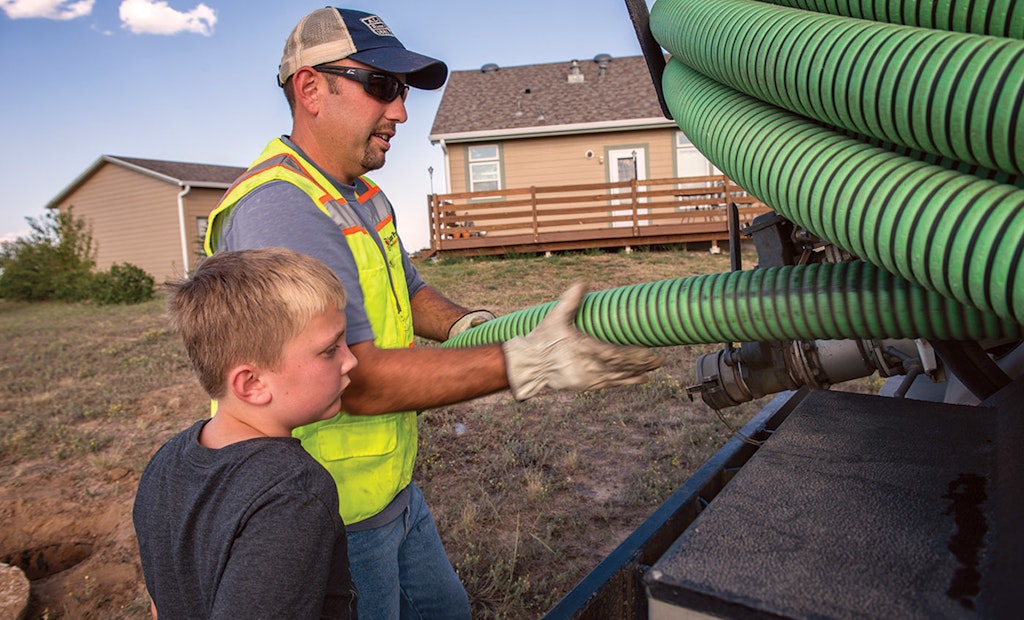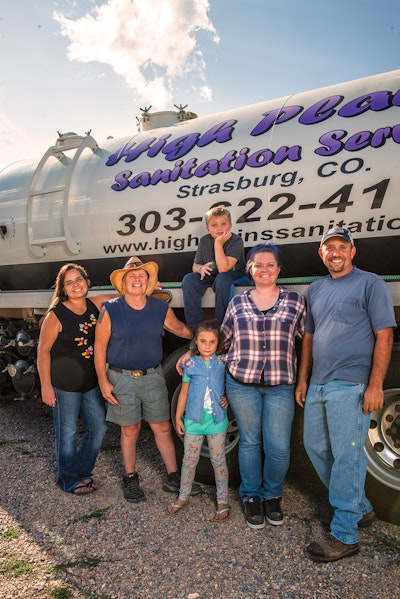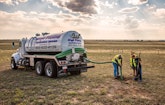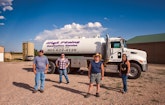
Jeff Nicoll returns hose to his vacuum truck while his son, Wyatt, observes the work at a residential job site.
When Pumper last caught up with Jeff and Kim Seipp, owners of High Plains Sanitation Service in Strasburg, Colorado, about nine years ago, they were coming up on the 10-year mark for their septic business. Today the couple is heading off to Florida for a long winter break, leaving their business in the capable hands of their daughter and her husband, Lisa and Jeff Nicoll, who they have been grooming to take over the business. The full transition will take about 10 years, as the Seipps will continue to help out during the company’s busy season.
While the Seipps are relieved to have found someone to take over their company, Lisa Nicoll is somewhat surprised to find that it’s her. She grew up in the business but then went her own way, picking up a Bachelor of Science degree in psychology, working for the Department of Energy and Wells Fargo Bank, getting married and having a couple kids. She never imagined going back to it. It was her husband, a master electrician, who made the suggestion after Lisa Nicoll’s sister and brother-in-law considered taking over the business but then decided it wasn’t for them.
“Jeff decided he wanted to take his shot at it,” Nicoll says. “He thought it would be nice to own his own business. He’s worked for other people most of his electrical career. He likes it, but he also wants to be the master of his own destiny. He likes working outdoors and working with his hands so he thought it would not be a bad idea.” Lisa Nicoll had mixed feelings but says she’s good at the administrative work so it was not hard for her to just fall back into it.
The Nicolls came on board in 2013. The training and transition process proceeded smoothly for about four years but accelerated dramatically when Jeff Seipp had a heart attack in May of 2017. He recovered but clearly it was time to get out. The younger couple stepped up to the plate and began taking over all day-to-day activities. Lisa Nicoll says they’re more than ready for the final test when her parents take their winter break.
SECOND TIME’S A CHARM
The company’s roots go back to 1959 when Nicoll’s grandfather Harvey Seipp started Columbia Sanitary. In 1992 his son, Jeff Seipp, bought him out, but a few years later, he sold the company to go into farming with a partner. When that didn’t pan out, he and Kim Seipp bought a 36-acre property in Strasburg, a town of 2,500 in the sparsely populated plains of Colorado about 30 miles east of Denver, where they started up High Plains Sanitation Service and eventually built a house.
This time around, they added portable restroom services, as there was a lot of growth in the area at the time. Kim Seipp became very active in Colorado Professionals in Onsite Wastewater and the National Association of Wastewater Technicians and continues to work hard in those organizations to increase the professionalism of the industry. She is currently the educational coordinator for both organizations.
Today the company still does pumping and minor repairs but gave up the portable restroom business in 2014 to focus on other work. They’ve added a new service line working on pumps and alarm systems as Jeff Nicoll puts his electrical skills to good use. And home sale inspections are also becoming a big part of the business, largely as a result of Seipp’s work with Colorado Professionals in Onsite Wastewater and the National Association of Wastewater Technicians. “She’s done a lot of work with the counties that are now requiring use permits for home sales,” Lisa Nicoll says. “And she’s helped build the inspection training program.”
IN THE OFFICE, ON THE ROAD
While Kim Seipp coordinates with the accountant and handles the banking, Nicoll is now doing most of the office work. She uses QuickBooks Online to handle the accounts. For marketing, she finds it’s still worthwhile to run ads in the local phone book and newspaper along with maintaining a web presence. She also has a few posters up around town.
She hasn’t done much with Facebook. “It just sits there,” she admits. “A few people have left us reviews there, which is nice, but I’m not sure right now what to do with it or how to utilize it.” They get a lot of response from reminder cards. And they’re thinking about doing team sponsorships now that their kids are in school, both to get their name out as well as to support the community.
Out in their 50-mile-radius service territory, Jeff Seipp does some of the inspections while Jeff Nicoll spends his time in either his electrical equipment van or the vacuum truck, a 2011 Peterbilt built out by Pik Rite with a 3,600-gallon steel tank and water-cooled Masport XL-400 pump. He can access QuickBooks Online from his cellphone if he needs to look up anything. He also relies on Google Maps for navigation and has a credit card reader that plugs into the phone. But Lisa Nicoll reports that internet access can be unreliable on the plains.
Waste is transferred to a 6,000-gallon converted gas tanker — or, for overflow, an old 12,000-gallon oil tanker — and hauled away daily by McDonald Farms Enterprises, which dewaters and land-applies it. Other equipment includes a RIDGID SeeSnake line camera.
WHEN IT’S JUST MOM AND POP
A challenge for small companies is when they occasionally have more work than they can handle, especially when emergency requests come in. Nicoll says they rely on a handful of companies they can call when overloaded. They also help customers fix their own problems. “We’ll talk to people over the phone and explain it to them,” she says. “And on our website are videos on how to unclog your inlet line if it’s plugged.”
Another challenge related to size is how the company can support four people during the transition period when it only generates enough income for two. Jeff Nicoll does unrelated electrical work on the side, and Lisa Nicoll supplements the family’s income by doing contract office work at home, including for the Colorado Professionals in Onsite Wastewater. They cut living expenses by combining their two households, with the Nicolls and their two young children moving in with the Seipps for 16 months before the Seipps moved into an RV to travel south.
KEEPING EMOTIONS IN CHECK
The Seipps have worked with their accountant to ensure the business provides them a comfortable retirement while affording the Nicolls a good living. Lisa Nicoll says the hardest part about the ownership transfer is not the financial or technical aspects but doing it with family.
“With family, the expectations are never the same on all sides,” she says. “You’re trying to not offend anybody because you can’t just be, ‘Well, I’m never going to see these people again,’ because you are. So you’re trying to make it as amicable and equitable as possible. But it’s hard when there’s such a different power dynamic because not only is it the business sellers and the business buyers, but it’s parent and child.”
Fortunately, there’s one person in the group who’s a little bit of an outsider and has the perfect skills to be a go-between, and that’s Jeff Nicoll.
“Part of the reason I think this has been successful for us is because my husband is a very easygoing, laid-back kind of guy,” Lisa Nicoll says. “He’s able to be that go-between and have the conversations with them. He and I will have discussions and he’ll take that back to the table. That’s been beneficial because there’s not the power dynamic that he’s working against.”
Has it been hard for the Seipps to let go? Yes and no, Lisa Nicoll says. “Some days they’re overjoyed and jubilant and way into it, and other days it’s (difficult) for them. I think as it gets closer they’re getting more and more anxious. It’s a control thing — they’re losing control. That’s probably the hardest part of their transition out. But on our end, we’re fine.”
WIDE-OPEN FUTURE
After the Nicolls settle into their new roles they’ll think about what they want to do with the business. One obvious area for growth is electrical work. “That’s starting to be a very lucrative aspect of the business,” Lisa Nicoll says.
As the population of Colorado continues to grow, the couple expects the business to grow as well. But they’re going to take it slow. “For now we’re going to just try to take it a year at a time and keep moving in the forward direction,” she says. “The fortunate thing about the septic business is that it’s fairly recession-proof.”
Babies and business
When Lisa and Jeff Nicoll moved to Strasburg, Colorado, in 2013 to work with her parents, Kim and Jeff Seipp, in their septic business, their son, Wyatt, was 3 years old and their daughter, Hailey, was 1. Although the goal was for Lisa Nicoll to take over the office work, she wasn’t able to do too much until the kids were older. “It’s really hard to try to run a business when you have toddlers running around,” she says. “It wasn’t until the kids were in school full time that I was really able to take over a lot of the office.”
It’s still the kids’ schedule that dictates hers, she says. She starts work after dropping them off for school and stops when she picks them up, although she sometimes finds herself working at night. Last summer, the kids were able to entertain themselves.
“But we also were able to go to the reservoir quite a few times and the zoo and visit friends,” she adds. And that explains one of the major advantages of owning a small family business.
“The nice thing about it — which is a lot of the reason why my husband wanted to do this in the first place — is that we can schedule around the kids and their sports games, school functions and other activities so that we can be there. Jeff was doing assistant coaching for one of their soccer teams, and I’m doing some assistant coaching this go-round. We’re always able to meet their needs first and then work the business around that.”
She knows what it’s like being a kid growing up in the business. She, too, spent time riding around in the truck with her father and playing with customers’ kids. As a teenager, she handled phones and answered basic questions.








